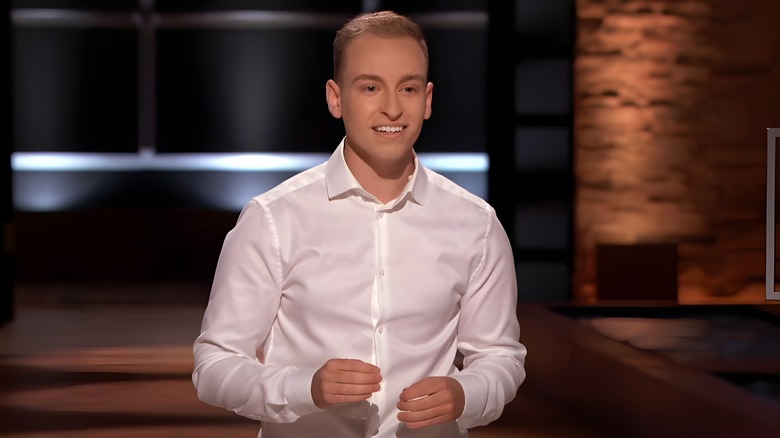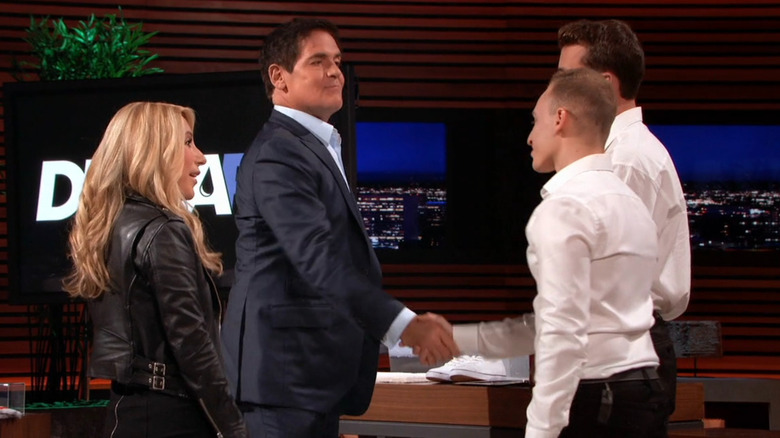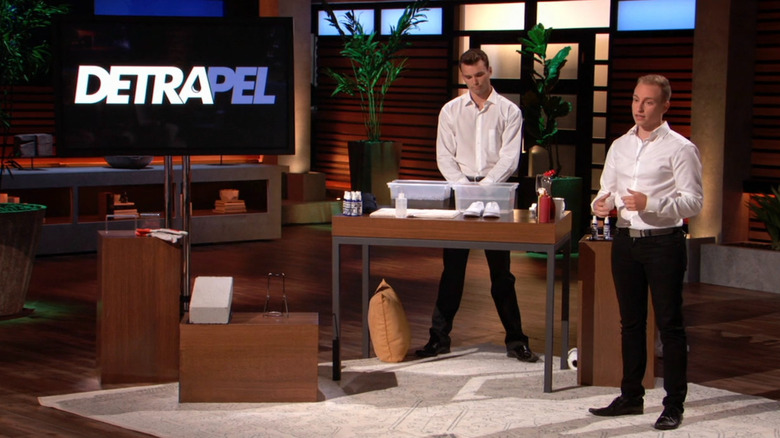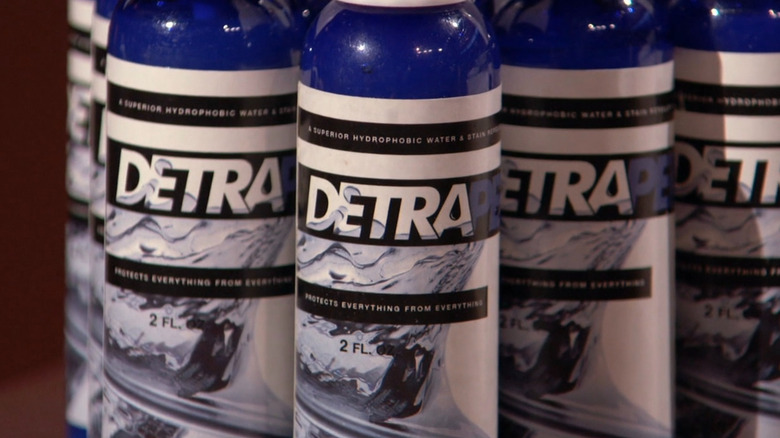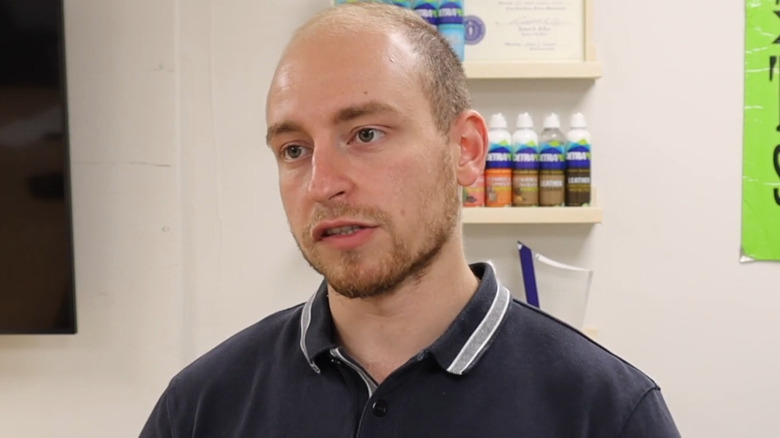Whatever Happened To DetraPel After Shark Tank?
Young entrepreneurs are nothing new on "Shark Tank," but few can quite match the prolific success of David Zamarin and his company DetraPel. Zamarin's business produces a spray that employs nanoparticle technology to effectively repel any liquid with ease off of shirts, shoes, carpets, and more. DetraPel is not only environmentally friendly but is also incredibly long-lasting, working on applied surfaces for upward of a year.
Zamarin is no stranger to the realm of entrepreneurship. Before beginning DetraPel at age 15, Zamarin ran the shoe cleaning company LickYourSole, which he would eventually sell for $150,000 as he shares on "Shark Tank." Keeping his sneakers clean was still a priority for the high schooler, and he began developing a cleaning solution with the help of researchers from Drexel University and the University of Pennsylvania's Singh Center for Nanotechnology. He opened up an Indiegogo campaign to secure funding, although this ended up failing, only raising $3,111 on a $50,000 goal. That didn't stop Zamarin who, after experiencing additional difficulties with a tricky manufacturer, was able to engineer a formula he was satisfied with.
The company was seeing some positive growth in its early stages, launching an online shop while also having DetraPel sold in a handful of stores. But is this budding entrepreneur and his promising product enough to get a shark on board?
What happened to DetraPel on Shark Tank?
"Shark Tank" Season 9 sees David Zamarin take the carpet to pitch DetraPel, with the intent of receiving $200,000 in exchange for 20% of his company. Entering the show, Zamarin spills a cup of coffee on his shirt, which gets the sharks laughing. But their jeering quickly turns into amazement after seeing the jaw-dropping capabilities of DetraPel in action.
Even more shocking is when the sharks learn that Zamarin is only 19 years old, with Robert Herjavec initially believing that he was in his 30s. He dives deeper into the business, explaining that they are on track to hit $300,000 to $350,000 by the end of the year. DetraPel's margins are similarly solid, as the product sells for only $12.99, with $1.14 per unit going to production costs. The company currently runs on a business-to-business (B2B) model where it primarily sells to establishments selling furniture and carpets. Lori Grenier questions its safety, but Zamarin affirms that the product itself poses no harm despite using nanoparticles and is both FDA- and EPA-approved. However, some of the sharks are concerned when Zamarin explains that DetraPel has yet to be patented, although the entrepreneur ensures that none of the top nano-tech companies he's visited have been able to pull off their formula.
Even in light of these worries, the sharks want in on DetraPel, with only Barbara Corcoran going out. Mark Cuban and Lori Greiner offer $200,000 at 25% while Robert Herjavec and guest shark Rohan Oza propose $200,000 at 23%. In the end, Zamarin goes for Cuban and Greiner, citing Cuban's establishment in the nano space and Greiner's sales abilities as his reasoning for choosing the dynamic duo.
DetraPel after Shark Tank
Unfortunately, DetraPel's deal with Mark Cuban and Lori Greiner did not end up going through. This is not uncommon in the aftermath of an on-screen "Shark Tank" deal, as further negotiations and additional due diligence can often result in either side choosing to back out. Nevertheless, the "Shark Tank" effect still hit DetraPel following the airing of its episode on January 7, 2018. "We had hundreds of thousands of visitors to our website within several minutes of the show airing," founder David Zamarin said in an interview with Entrepreneur Magazine. Additionally, the company gained interest from various players in the vehicle and carpet manufacturing space.
The team continued to see healthy growth, transitioning to a 12,000-square-foot facility, expanding to an eight-person team, and getting on track to hit $125,000 a month by the start of 2020. To stay relevant during the COVID-19 pandemic, the company switched to selling its own line of sanitizing products such as the DetraPel ecoCleaner and Disinfectant. The shift proved to be a rewarding one as DetraPel moved to a 40,000-square-foot workspace and increased its team to include 15 employees. Between March and May of that year, the company reported record sales.
Is DetraPel still in business?
DetraPel has more recently seen some major changes, but the business remains committed to its original vision. In August, DetraPel announced that its products would be rebranded as ProofPlus. Under the new shift, David Zamarin also started a new company called Impermea Materials, which develops environmentally conscious protective coatings for the food packaging and healthcare markets.
These efforts couldn't be fully realized without some help. Following the rebrand, it was announced that the company had completed a new round of investment funding, receiving $7.6 million from such sources as Icebook Investments, Touchdown Ventures, Boro Capital, and major ink manufacturer INX International. The funding will be going toward upping production to meet the current demand for protective materials as well as the development of its laboratory and workplace resources.
For those looking to get their hands on DetraPel's products, you'll now find them under the ProofPlus name. The company offers a wide range of shoe, fabric, and leather protectors on both its website and Amazon. Over the years, founder David Zamarin has had some notable honors, including winning the Young Entrepreneur of the Year award from the U.S. Small Business Administration, being included on the 2021 Forbes 30 under 30 list, and being listed as a game-changing young founder by Entrepreneur Magazine. By 2022, DetraPel was estimated to have a net worth of $13 million and revenue of $23 million a year.
What's next for DetraPel?
Even without Mark Cuban and Lori Greiner on board, DetraPel has done very well for itself. The company remains a force to be reckoned with, bringing in millions a year and being a trusted name with both consumers and other businesses alike. As it settles into its recent rebrand from DetraPel into ProofPlus and Impermea Materials, the future looks bright for David Zamarin and his team as they continue seeking new avenues to present their products.
In August, DetraPel crossed a major milestone, having now been around for 10 years. To celebrate, the company released a video where Zamarin commented on the team's accomplishments over its now-decade-long history. "I think that we're finally starting to bear the fruits of our labor," he stated. "I think we're finally getting the attention that the company and the product have deserved for a very long time." Along with praising their past and present achievements, the founder also shared what he was looking forward to in DetraPel's ensuing endeavors. "What excites me the most about the future of the company is frankly just being able to finally commercialize some of these really unique industrial solutions that the industry has been yearning for nearly a decade," he said.
This sentiment is very much in line with Zamarin's comments from a 2020 interview with My Brand Journey, where he said that DetraPel was looking for ways to break into the retail space. Doing so would surely cement the company's already reputable name amongst average consumers and the industry as a whole.
